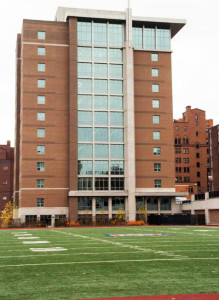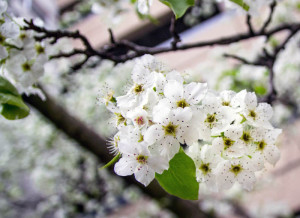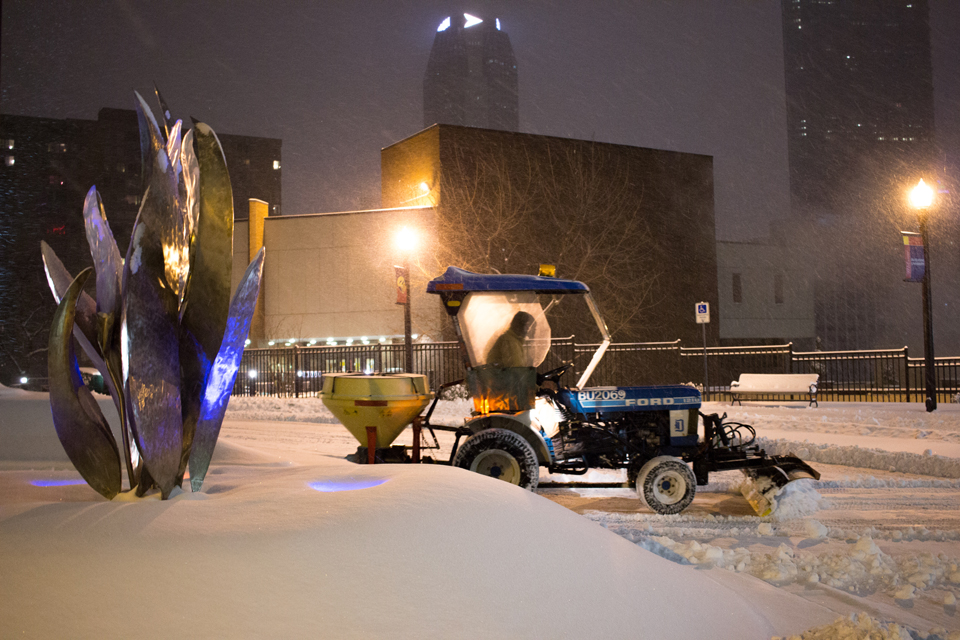

By: Lauren Zawatski | The Duquesne Duke
As Earth Day comes and goes once more, the task of “going green” and keeping planet Earth healthy and sustainable continues to be celebrated.
Duquesne does its part not just every April 22, but year round as well. From the “green” co-generation system that powers campus, to community clean ups, to environmentally focused student organizations, the University community has started with the campus and continues to branch out when it comes to sustainability efforts.
At its core, the University is grounded upon a sustainable system. Mark Johnson, Duquesne’s Energy Center manager, said the University generates its own electricity, steam and water at its co-generation plant. A co-generation, or co-gen, system is one that produces two sources of energy, electric and heat, from one fuel source.
“At the heart of the facility is a five megawatt generator, and about 85 percent of the campus’ electricity is from this generator,” Johnson said. “We’re either making our own energy through the co-gen and what we buy is green, making us totally green.”
Duquesne’s efforts at recycling and reuse have also been key in keeping the campus environmentally friendly. William Zilcosky, director of building services, grounds and operations, works primarily with the campus’ recycling program and how those items are managed. He emphasized the importance of reuse along with recycling.
Zilcosky said the University has continued to install water filtration stations over traditional water fountains across campus, a measure that can cut back on the use of plastic bottles and instead encourage reusable bottles.
“If you’re reusing your water container on a daily basis, in a lot of ways that’s more important than recycling four plastic water bottles a day or week or however many you drink. You’re not creating that need to have the plastic bottle manufactured in the first place,” Zilcosky said.

Des Places currently has some of these stations, as does the second floor of the Student Union. Zilcosky said that 65 water stations are currently installed on campus and the University plans to install 250 over the coming years.
Duquesne’s efforts at sustainability stretch beyond campus as well. Kate Lecci, a Duquesne campus minister, explained that the annual Spring Clean-Up plays a huge role in maintaining a sustainable community. This year, 555 students, faculty and staff along with 130 community members participated in the event. The clean up is a blend of picking up litter that can range from gum wrappers to tires as well as “greening” the Hill District and South Side by creating and preserving garden beds.
“We come together and work together to make these neighborhoods better,” Lecci said. “Areas where I was a section leader in 2008 in the Hill District aren’t as dirty now; there isn’t as much litter. We’ve been able to work with the community and get those areas developed.”
Additionally, keeping Duquesne and the community sustainable is just as important to students. Two student organizations have been a crucial part of educating the student body and faculty about sustainability and participating in the campus-wide effort.
The Ecology and Evergreen clubs are two organizations on campus devoted to protecting and sustaining the environment and all that is in it. Though both are environmentally based, each has a separate function. Lauren Drumm, a senior environmental science major and the president of both organizations, said that while the Ecology group is aimed at those who seek to do more ecological research, Evergreen is focused closer on activism.
Within Evergreen, one pivotal goal is educating the Duquesne population. The outlet used for this purpose has regularly been documentaries.
“We host documentary nights covering topics about genetically modified organisms (GMOs), the United States’ addiction to oil and how that causes sustainability issues in the future,” Drumm said, explaining that the documentary topics are diverse and can range from soil to the melting glaciers. “We try to educate the general Duquesne population about those issues and about the benefits of renewable energy.”
Building and maintaining community gardens is another initiative Evergreen organizes. The group picks up litter around the gardens and participates in the weeding and planting within them. Drumm said that these tasks usually occur two to three times a semester in the Uptown neighborhood surrounding campus.
“Space that would otherwise go unused is used to grow gardens,” she said. “We get to work with the local community members and see how those gardens benefit them. If people only have to walk a few feet to get their produce as opposed to driving to Giant Eagle or somewhere else, that’s a more sustainable option for them.”
Although the Ecology club may serve as a less evident support for sustainability, Drumm said, its efforts are impactful.
“The ecological research we do on things like bird and salamander counts contributes to understanding the health of ecosystems in the Pittsburgh area,” she explained. “From year to year we keep this data to see if there are any significant changes, which is good for looking at the sustainability of Pittsburgh ecosystems.”

Duquesne isn’t finished with its sustainability efforts either. Various future efforts continue to be planned and eventually implemented.
“We recently joined the Green Building Alliance’s Pittsburgh 2030 District, and the goal for all of the members to reduce energy consumption by 50 percent by the year 2030,” Johnson said.
Johnson also explained that the possibility of a master-metering plan that would make campus-wide energy management achievable is being discussed. Options are still being explored and funding needs to be procured.
Within the Ecology organization there is also a future endeavor in development.
“For Ecology we hope to get involved in the Strategies for Ecological Education and Diversity (SEEDS) program which is the national chapter of all of the ecology clubs in the country,” Drumm said. “Once we get involved with them we’ll have more opportunities to get grants for ecological research.”




